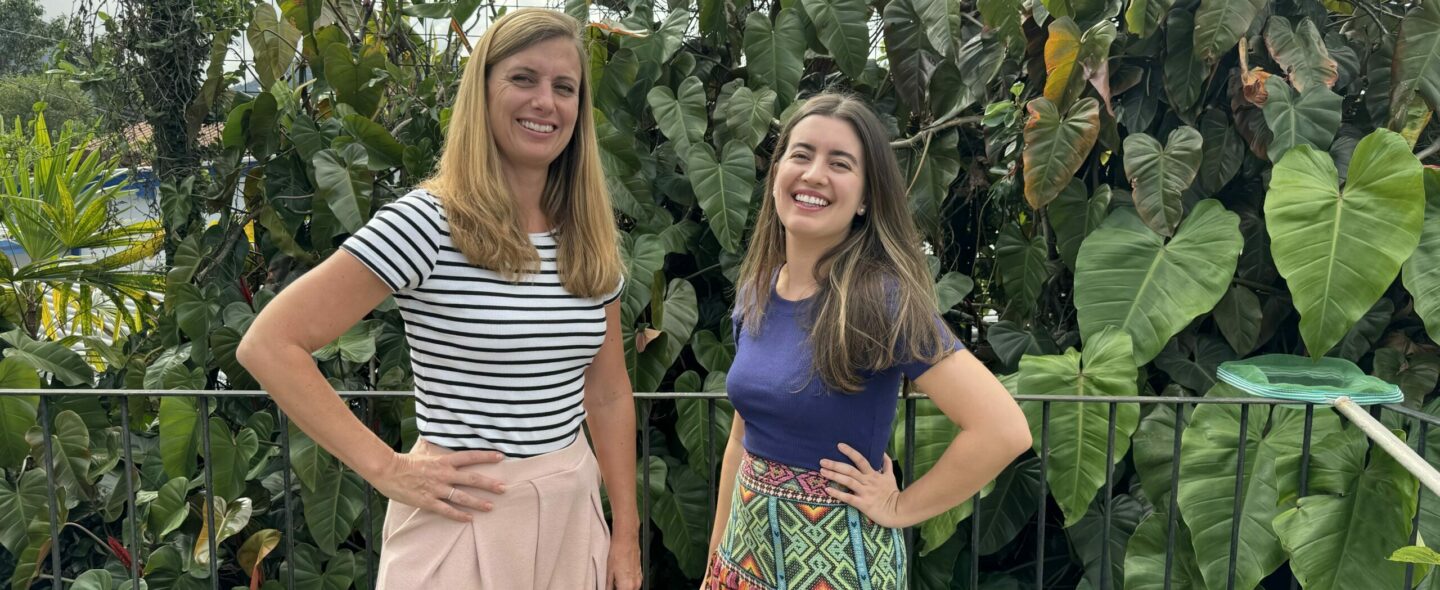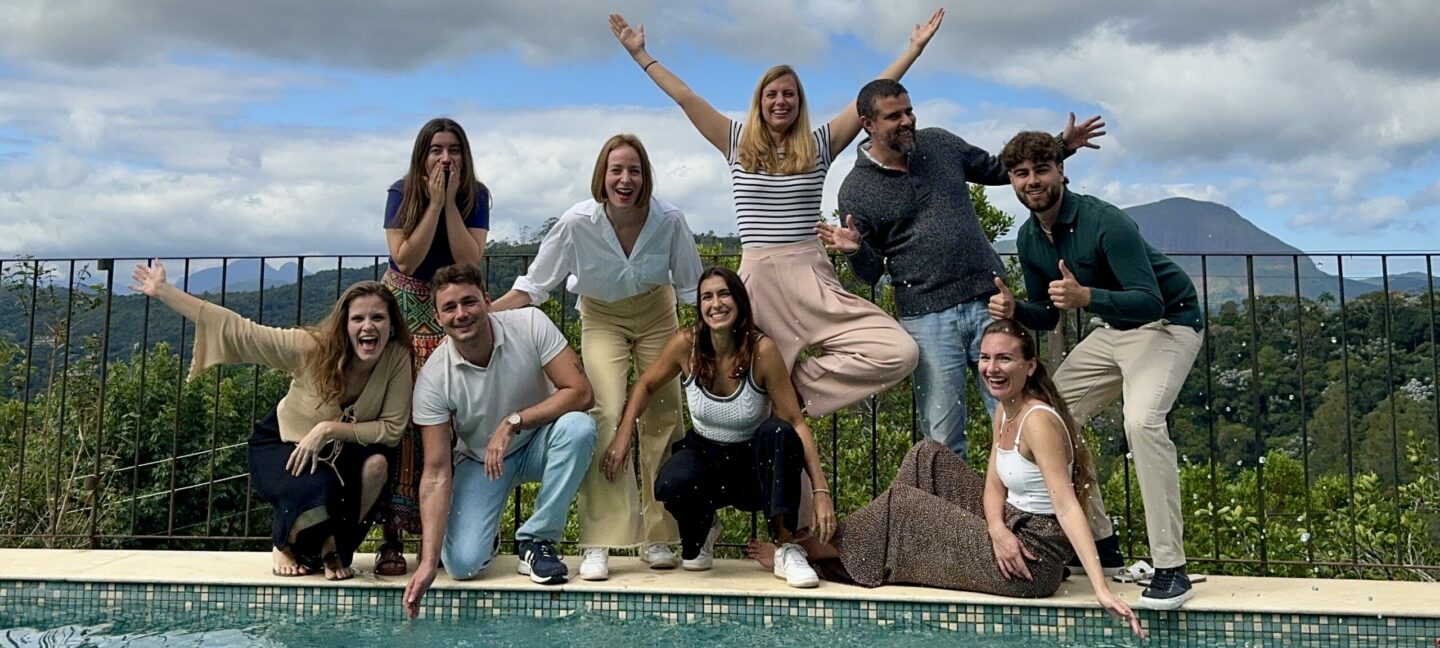
After 10 years as a part of the Swissnex network, our CEO, Malin Borg, is stepping down and returning to Switzerland. Under her leadership, Swissnex in Brazil has raised its profile through innovative programs and long-term partnerships to strengthen Swiss-Brazilian collaboration. As she departs, she leaves the organization in the capable hands of her Deputy, Bianca Campos, who will serve as CEO ad interim until a new CEO is appointed. In this interview, she reflects on her unique relationship with Brazil, the milestones of her tenure, and the future prospects of Swissnex.
To kick off, tell us a little bit about your relationship with Brazil
Over 14 years ago, when I was still a student, I visited Brazil with two friends from university and fell in love with the country’s beauty and diversity. But what most impressed me were the people: thrifty, resilient, and with a sense of hospitality that I had never seen before. It was also on that trip that I met my future husband, which, of course, also helped me form a very special bond with the country.
Subsequently, I kept returning to Brazil, and finally, through a string of coincidences (or was it serendipity?), I was hired by Gioia Deucher, former CEO of Swissnex in Brazil and San Francisco, as the first local employee of the newest addition to the network: Swissnex in Brazil. Even though I had some experience in Brazil’s startup world, it was in this role that I discovered a Brazil unknown to the common tourist. It was still a period of growth and high hopes for Brazil’s future, exemplified by the emblematic cover of The Economist. Yet, the country had only just started seriously investing in internationalization with programs such as Ciência sem Fronteiras by the federal government. Brazil was still uncharted territory for many of our Swiss partners.
What were some of the biggest differences between your first and second “terms”?
You spent three years at Swissnex in Brazil from 2013 to 2016, returned to Switzerland, and have been heading the organization for the last two and a half years. What were some of the biggest differences between your first and second “terms”?
Despite being relatively close in time, the experiences were wildly different. On a macro level, my first years in Brazil were marked by the festive mega events of the World Cup and the Olympic Games but also by the growing social unrest and politicization of the population coupled with Latin America’s biggest corruption scandal lava-jato. When I returned at the end of 2021, there was not much to celebrate. Brazil was slowly emerging from the harrowing consequences of the COVID-19 pandemic, and political extremism was causing rifts even within tightly-knit families.
I also encountered different scenarios in our areas of action. While in the early years, there was a sort of “naive enthusiasm” and willingness to engage, the expectations from our Swiss partners, such as startups looking to enter the Brazilian markets or researchers searching for new partnerships, were higher and more demanding. Moreover, sustainability has gained a much more prominent role and is central to all discussions than back in 2013.
What are some of the key achievements you are most proud of during your time as CEO of Swissnex in Brazil?
In line with the demands we saw popping up from our contacts in Switzerland and the trends we were observing in Brazil, we decided to define two focus areas where Swissnex in Brazil would develop deepened expertise and dedicated programs. Related to the overarching network-wide theme of the United Nations’ Sustainable Development Goals, we decided to focus on the Future of Food and Biodiversity/Bioeconomy.
I am incredibly grateful for my team’s wholehearted embrace of these themes. We developed solid programs like the Bootcamp Future of Food or the nexBio Amazônia that I am certain will have a lasting impact on all parties involved. With those topics, we could pinpoint areas where Switzerland and Brazil are extremely complementary in what they are looking for and what they can offer. It also gave Swissnex in Brazil a clearer profile, offering concrete opportunities for our Swiss actors to engage with.
I am also very proud of the high-quality partnerships we have strengthened and established in the past years. Swissnex relies on public and private funding to realize projects, and the commitment of our partners is demonstrated by the fact that we were able to almost triple the third-party revenue compared to before the pandemic. This has allowed us to think bigger as well as to sometimes say no to less impactful projects. Beyond external partners, the collaboration with Team Switzerland in Brazil has also been excellent, and I am confident that this will reach new heights as the COP 30 in Belém approaches.
Last but not least, I am proud of the Swissnex in Brazil team, a group of talented, creative, and motivated Swiss and Brazilians in two different cities who have worked arduously for the past two and a half years to conceive, plan and execute the many ongoing programs.
Looking to the future, where do you see the most potential for Swiss-Brazilian collaboration?
I believe there is still a great deal of mutual ignorance about areas of excellence in the two countries. The distances, both physical and mental, are large and will only start diminishing through individual exchanges, an open mind, and a willingness to leave one’s comfort zone.
More specifically, Swiss research and technology can have a hugely amplified impact in a continental country like Brazil, with rich biodiversity in and beyond the Amazon rainforest and an enormous potential for renewable energy solutions in the Northeast. But also, beyond the field, there is much potential. São Paulo’s GDP is larger than the country of Sweden’s. It hosts a vibrant startup ecosystem with interesting open innovation programs by the numerous corporates for which Swiss startups offer promising solutions.
I believe there is still much more to be done to maximize this potential. Brazil to me, is also a synonym of creativity and a bustling arts and design scene that complements Switzerland. But for all of that, our Swiss partners need to be willing to take this first leap of faith and look towards Brazil!
What will you miss most about Brazil?
All the little, daily interactions with people! In the 20 minutes it takes me to get from my house to the office, I exchange some friendly words with at least four people on the way, whereas in the 1 ½ hours commute that I used to have in Switzerland, I would normally not speak to a soul.
In the work environment, I have always been impressed by the incredible openness of my team as well as our Brazilian partners, to what were sometimes quite crazy ideas. I could not have asked for a better country to call home for all these years, and I am deeply grateful for all the lessons I have learned and that I get to take back with me to Switzerland!
What will the coming transition period look like for Swissnex in Brazil?
As I leave the organization, my Deputy and Startup & Innovation Program Manager, Bianca Campos, will assume my responsibilities as CEO ad interim until a new CEO is appointed, most likely starting in January 2025. Bianca is a material scientist, engineer, and specialist in open innovation with experience in Brazilian and multinational corporations in Säo Paulo. She is perfectly equipped to navigate our experienced team through the coming months, where we will see the realization of big projects such as the pilot program of nexBio Amazônia, the participation of the ETH BiodivX Team in the XPRIZE Rainforest, the Infrastructure Forum, and the tenth edition of the Academia-Industry Training.
I can’t wait to follow the journey from afar. Thank you all for your continued support!
